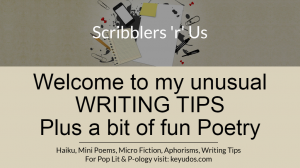
I wouldn’t class myself as a normal writer. For a start, I left school at 15 and have had no formal education since – never even had a writing course or read a ‘how to’ book.
So how on earth can I offer writing tips? I can’t – or should that be ‘cannot’?
But I can tell you what I think about writing and related issues with a certain degree of authority – even if my grammar isn’t always correct.
That authority lies in some 200 short pieces I had published in nearly 60 UK Small Press magazines from 1987-93, and the 700,000+ hits I had on my first blog.
So I do have a thing or two to say on writing, even if I don’t expect you to write like wot I do.
YOU’RE NOT MAD?
This is a difficult one. You’ve lived life for some time and you’ve decided you know enough to write down your thoughts and become a writer. And what does your family say: ‘What? You must be mad.’ And guess what. You are.
Writing, you see, is a form of therapy; a way to extinguish your demons; to decimate fictional lives in order to make you feel good. Writing is egoistic, the writer the creator of his own worlds to be transformed or destroyed.
The writer will soon become a bit of a loner, skulking into that private piece of the house where others go at their peril. In the little hideaway, mind creations flow, and words refuse to express and you curse, and it sounds like you’re talking to yourself.
Communicating with the family will become tiresome. They think you’re just sat in the chair doing nothing, so they want to talk. But … you’re thinking! You’re plotting the next tale. You’ve descended to lonerdom, but you have a real world to live in.
How do you tell your family you’re not mad? How do you convince them that you are the same person you were before you began to write? How do you explain in words what you so easily put on paper? You can’t. Because you are.
*****
Just in case you fancy doing
the PopLitChallenge, you’ll
find some examples on this
page, & loads more on my
Blog: see button above
*****
LOVE THE WORD?
Aspiring writers are often kept at bay by the insistence on the perfection of the word. Of course good, inspired English is required, but the literati have got it wrong when they say the word is all important.
Maybe there were too many unemployed writers; maybe they put pressure on universities, etc, to bring out the dreaded academic writing course. But the reality is, somewhere along the way, the word became more important than the story.
The perfect prose style was the result. From stream of consciousness to gobbledegook, the only writers worth acclaim were those who buried the story beneath literary balderdash and piffle.
I repeat, good English is important, but not at the expense of the story. The beauty of the word should be restricted to poetry, allowing the novelist to do what they do best – write a story, with a beginning, middle and an end.
Of course, the literati will now be calling me a philistine, but hear this, ye purveyors of good words. The purpose of writing is, above all else, to communicate. Using perfect prose to impress a snobbish elite is not communication, but indulgence.
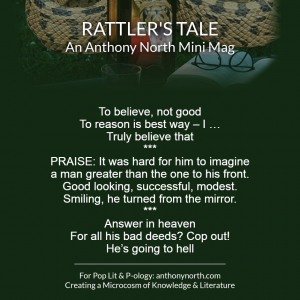
TECH V LITERATURE
I’ve only been using a computer for a short time, but I’ve noticed something about my writing. In one way, I feel it has got worse. In another, I guess it has just changed. How can this be?
It reminds me of an argument I heard many years ago – can’t remember where, but it was a good one. Basically, the argument goes, the quicker the means of writing, the less eloquent your words become.
The most obvious reason why is that the faster you can write, the less time you have for thinking about what you’re writing. In the past, they had plenty of time, and had the space to think up beautiful words. Now, we can write faster than we can think, so words become more basic.
This is borne out by history. In Shakespeare we have pure poetry. By the 19th century, prose is beautiful, but at long last it IS prose. With the introduction of the typewriter, we see prose becoming more compact, with less descriptiveness. And with the computer, much description has disappeared completely.
Today’s prose tends to be functional, whereas in the past it was a true craft. Mindst you, I can’t say this is a bad thing – all too often prose was overwritten in the past. But I still ask, was my writing better before the computer? Or maybe you’ll decide it’s academic – I’m rubbish, anway.
HOW TO DO PROPER RESEARCH
Writing non-fiction, whether article, essay or book, can be a nightmare. This is principally because they contain facts; and believe me, there is no such thing as an absolute fact, no matter what Gradgrind said.
With every ‘fact’ there is an army of differing opinions. And if a particular opinion is held strongly, all other treatments of the fact will be rubbished. It is a situation you cannot win, so make sure you have broad shoulders. And it gets worse.
This will often become clear when your work is published. If you’ve made a major blunder, someone will tell you. If you haven’t, some smart arse will find something obscure to quibble with. Ignore him or he’ll drive you mad.
Sometimes, though, he will prove what a fool you are. This is usually due to a ‘fact’ you have used because you know absolutely that it is right. Indeed, so sure are you that you didn’t even bother to look it up. This is a big mistake. We’re all delusional at times.
When deciding what a ‘fact’ is, the best place to begin is with the two most opposite views. From there, go to sources taking you ever closer to the centre. You still won’t please everyone, but at least you can convince yourself you’ve covered the subject.
This said, sometimes you can research too deeply. Spending hours on dozens of books and websites for an article is ridiculous. Similarly, it is too few for a book. If you know the subject well, you can form a balance. If you don’t, welcome to hell.
In the final analysis, if you want to write non-fiction you have to have discipline above the mere story writer, for the critics are even more severe if they think themselves an expert on the subject. Believe me, that’s a fact – or maybe not.
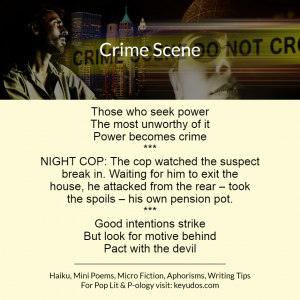
WRITER’S BLOCK
Writers’ block. I’ve heard of that. It’s some strange affliction where a writer suddenly finds he has no ideas and no ability to write. It can, it seems, be quite apocalyptic. Hemingway blew his brains out when it afflicted him. Or so some say.
Personally, I’ve never had it. Yes, there are days when I don’t feel like writing. There are even days when I can’t think of a thing to write. In the former, I give myself a kick; in the latter, I take out my copious notes and get over it.
Maybe that’s the secret to writer’s block – plenty of note writing every time you get an idea, and simple willpower to say, ‘I am a writer; that’s what I do.’ And then get on with it.
Of course, if this is so, then we can argue that writer’s block is no such thing. It is simply the mood you’ve gotten yourself into. It is a reaction and a rebellion against who you are. Either that, or you’re not a real writer – at least, not a writer with passion.
You see, writing is so much a part of my life that my life wouldn’t be whole without it. It is my way of coping with life and understanding that life, and all the little bits that go with it.
With such an attitude writer’s block cannot enter the writer’s world. So if you seem to be suffering writer’s block, then you’re not passionately a writer, or you’re just being self-indulgent. And you could end up like Hemingway. A quitter.
WRITE WHAT YOU KNOW
Write what you know. That’s what we’re told. If we don’t know about it, how can we write about it? Actually, quite easily. Life is full of experience, and we have a mind to relate those experiences into many areas of our lives.
Vital to this mental process is common sense. This is a faculty of mind we can all rely upon. It’s like a little piece of intelligence up there in the brain, constantly telling us how to relate to this or deal with that. It is one of the writer’s best friends.
No matter what the subject, we are bound to have experience of it. And from that glimmer of understanding, thoughts can so easily come, ready to be noted and finally written down. But of course, there will be breaks in your knowledge of this subject you don’t know about. That’s where research comes in.
Contrary to belief, in many areas of writing, research is not the central tool of the craft. Experience is. Research is the thing you do to fill in the blanks and allow the final piece to be co-ordinated and whole.
Write what you know. What a load of rubbish. It is the one piece of advice that stops many writers reaching their full potential. Yes, the finished piece may be rubbish, but it’s up to publishers and readers to decide that. Not you.
Write what you know. Never has such a terrible piece of advice been given. Writing what you DON’T know may be the secret to unlocking the area of writing you’re best at. So ignore the advice. It is only used to keep you out of other writer’s genres.
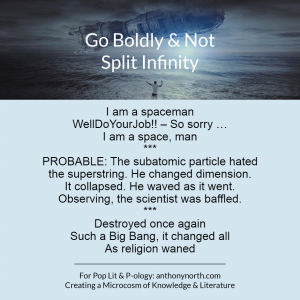
LET ME GIVE YOU SOME ADVICE
Oh dear, don’t you just love them. You tell them you’re a writer and they’re only too eager to offer advice. You can decide they don’t know what they’re talking about, but sometimes they are writers themselves. You’ve got to listen, haven’t you?
No – not necessarily. Writing is different for everyone. Some do it one way, some another. There are many styles, many habits, many reasons for writing in the first place. Just because someone is a writer, it does not make them an expert for you.
Yes, it goes without saying that some writers can offer invaluable advice. Take me, for instance. Or maybe not. But some are simply bores, and you can get very confused indeed if you don’t know how to balance what makes sense and what does not.
The dreaded situation, though, is the writer who decides you have merit and takes it upon himself to nurture you. This is the worst offender, for this type of writer is usually a dysfunctional loner who doesn’t know much about it. Except me, of course.
BEST IN THE WORLD
They say that writers have big egos. In one sense this is quite true. But I suppose you have to be arrogant in order to separate yourself from the masses. After all, if you think you’re just ordinary, then you may as well sell the computer and take up stamp collecting.
That’s why I consider myself the best writer in the world. Yes, I know, this appears to be arrogance above the norm. But hold on a minute. If you don’t aim for the top, you’ll never get half way.
Ego, you see, is not what it appears to be. Indeed, I have a mantra when it comes to psychology – show me a confident man and I’ll out the wreck. For it seems to me that confidence is so often a façade to hide inner insecurities.
Hence, when I say ‘I’m the best in the world,’ it is really an aspiration based on a psychological need to succeed. And that, good reader, is the opposite of true arrogance.
Unless, of course, I am.
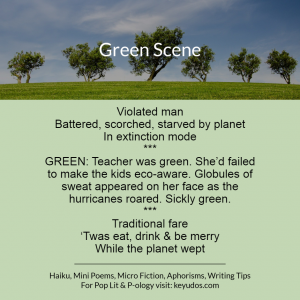
EVERY PSYCHO SHOULD WRITE
I sit down to write, and so often I think, who shall I kill today? Who has really angered me – who deserves to die. Of course, I’m not thinking of real people, but characters I’ve devised. But isn’t there something of the real in all fiction?
Don’t worry, I’m not a psycho. I’m quite an easy going fellow – not so quiet that I build up and explode, but quiet enough. Rarely does a violent feeling rise inside me – except, so often, when I write.
I used to be short tempered, but that all seemed to change when I began to write. It was as if any aggression was channeled into the craft. And it seems to be a general rule. Writers, artists, musicians rarely kill, it seems. Yes, they can be erratic, but Caravaggio aside, I cannot think of one famous murdering creative type.
Writing, I think, should become a therapy all its own. It curbs your aggressions, and is perfect therapy for the mind. Now, how do I feel? A short story I think. All those characters. Do I feel God-like? I’ll kill them all.
AFTER THE LAST STORY
The answer’s obvious. After the last story, the next one – and pretty damned quick. You see, there’s nothing quite like reading the finished piece, knowing you’ve created it – the plot, the characters, the descriptiveness, the dialogue.
Sometimes it will have been written in a methodical kind of way, whilst at other times creation is a fever of activity, your fingers whizzing round the keyboard as if a concert pianist. Perspiration is not just through physical work.
Sometimes a thought enters your head like ‘am I ever going to pack in this storytelling game?’ But the answer is immediate. Not on your life. Even if, at heart, it occasionally becomes tedious – and believe me it does – you know you’ll carry on.
You have to – you know you have to – because it’s an addiction. It’s an addiction worse than any drug, because the need for the next high is immediate, and there’s no hope of therapy to help you break the habit.
If I’d known what it would be like after the last story, would I have begun the first? It’s pointless looking back. But a thought for the future: what comes after my very last story? That’s easy. My funeral.
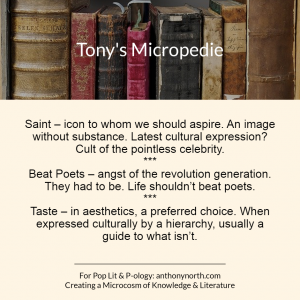
HOW I BECAME A WRITER
If I did, of course. I guess that’s up to you to decide, dear reader.
Where did it all begin? Well, as a kid I was good at English Literature. I don’t know why – maybe it was just natural. Maybe that’s how it has to be with a writer. But after school, life took over and it never entered my head for … years.
Not until I was 27, infact. In that fateful year I came down with chronic fatigue syndrome, or CFS. Suddenly my fast lifestyle turned upside down and I was left with a very different life. But a life has to be filled.
The first glimmer of my new life came when it was clear no one had the faintest idea why I was ill. I didn’t like mysteries just standing there, waiting for attention, so I began to research the subject.
I never found an answer, but I found out an important fact – which was ‘facts’ rarely exist. Indeed, not only this, but most experts hadn’t a clue what they were talking about.
This arrogant, egoistic conclusion led to me having a thirst for knowledge – basically, I wanted to know everything, and see just how bad our state of supposed knowledge is. And well, once you realize a thing like that, writing is the obvious way of getting your thoughts out.
That was the first clue to how I became a writer …
… if, of course, I did …
But it suddenly dawned on me that I’d done quite a lot in my life, and there were great experiences to fall back on, for the good or bad. And in realizing I could analyse my life, I also realized that, perhaps, I could analyse others.
And in such a way I became an observer. Infact, it was just too easy, ‘cos half the time I wasn’t capable of actually experiencing life to the full, anyway.
And observe, I did. Everything. And then I learnt to turn it around in my head, and I ended up producing, not just essays, but stories …
So that’s how I became a writer.
If, of course, I did.
A WRITER’S POWER
Well, the title’s wrong for a start. I don’t think a writer can ever have ‘power’, but I use the word because I like snappy titles. No, the word I’m really looking for is ‘influence.’
Now this is a different matter. So okay, this is a piece about ‘a writer’s influence.’ And let’s face it, there hasn’t really been a great human movement without a book behind it.
There are two arguments over the influence of a writer. Does his craft ‘reflect’ or ‘define’ our culture? Just take a typical Soap Opera. Issues that are relevant to the day are played out in – well – sensational fashion.
It is correct to say that, here, the writer reflects society – this is where he got the idea from. But is it possible that, in reflecting something in sensational form, he ‘defines’ it? Basically, does the social ‘story’ being played out make it more likely that it will happen in society more often, and more dramatically?
Of course, I’m not saying, here, that the writer can directly affect a person and make him do something. It’s more subtle than that. More a probability of society moving in that direction.
I think storytelling acts as a conduit for social currents. The writer intuits something happening in society, and in creating it in cultural form, the culture moves forward – or backward – as the writer suggests.
It is all to do with the ‘symbol’. For as semiotics is showing us, we follow them, don’t we?
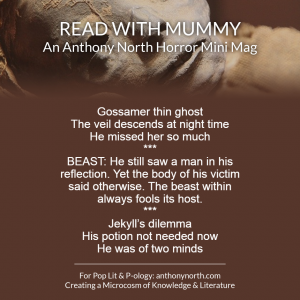
LITERARY TRENDS
Okay, I read a lot of modern fiction. It’s one way of keeping up with literary trends. But time after time I ask myself: will this writer survive the test of time?
And time after time, the answer is no.
To me, this is a depressing state of affairs. I can see, in a couple of hundred years, people could well look back at our culture and see something approaching a Dark Age.
In art, we have the ‘conceptual’. This is where it starts to go wrong. Art is becoming non-permanent – a brief exercise in sensationalism and then it’s gone. Of course, this IS art. After all, art is supposed to be a symbol of society. And isn’t our society becoming increasingly faddish and sensational?
And an obvious outcome of this has rubbed off on the novelist. Whereas art has become totally an expression of the individual artist, so, too, with the writer. The literary novel has become autobiographical, often without a story. And also much more …
Stories are also about society. This is a point often missed in literary fiction today. Great novels are, in a sense, Arthurian, in that they concern a ‘hero’, who experiences change, and somehow places that change in his society.
With the individual as centre of his own story, this vital link between character and community is degraded.
Of course, there are exceptions – in both art and literature – but as a general trend, I think this holds true. And I just don’t think the experiences of an individual alone will be enough to hold people’s attention down the centuries.
Or am I wrong?
SHAKESPEARE’S SECRET
Okay, I’ve conned you. If you’ve come to this post to learn some amazing secret about Shakespeare’s enigmatic life, then you’re not. Rather, I wanted to grab your attention, and in doing so I used a classic storytelling device
No, the secret I want to impart is why Shakespeare remains the most popular and well known classic writer of all time. One answer people don’t realize is ‘availability’. The plays were quickly collected into a single folio, so he is easily accessible, even if his actual writing isn’t.
Shakespeare is a psychologist’s dream. This in itself is an important point. His characters can be mad, often ridiculously in love, or hungry for power. They don’t begin with this, so the writer explores the points of transition from sanity to madness. We are fascinated by the reasons for this.
Similarly, his characters are ‘archetypes’. By this, I mean they fit a standard type of character. He writes about classic heroes and heroines, villains and buffoons. A glimpse of each exists in our own minds. Hence, they filter straight through the words and bury themselves deep in our psyche.
His plays revolve around situations. This may seem an obvious point. Most stories do. But Shakespeare tells them in the raw, unaffected by incidences of place. His love affairs, schemes and conspiracies – his murders and supernatural events – are timeless and fit any place at any time.
Shakespeare is therefore universal. He delves deep into human situations, the reasons, the impulses. And in doing so he speaks directly to the person. And through this, his plays apply directly to you, be you sat in an Elizabethan audience, a modern theatre, or the medium being used in a thousand years hence.
More than any other writer in history, Shakespeare understood the eternal now.
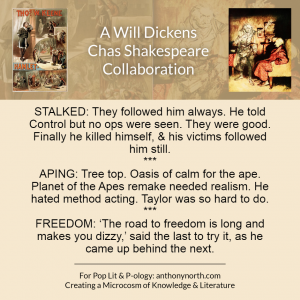
A NOVEL CHARACTER
A good male character in a novel is not as novel as you think. Indeed, he seems to follow a simple path through the chapters. And rule number one has got to be, don’t make him nice.
Nice is yuck! Boring. Think of Pip in Great Expectations, and how boring a novel it would have been if Dickens hadn’t filled it with marvelous, eccentric, and deeply flawed personages.
The best characters are on the borderline between moral and not. Infact, much of the good novel is about how he copes with this contradiction, trying to do right, but so often failing.
And the crux of the novel is invariably about change. This is why the character must be how he is. If he had a simple, straight-forward mentality, then there would be no doubts as to his actions. It is the doubt that makes the novel great.
If I had to pick a favourite character from a novel, it would have to be Heathcliff from Wuthering Heights – very bad, but very intriguing. But also set close to the place of my birth. Which makes him so – how can I put it – fictitious.
This most passionate of romantic heroes actually exists in one of the most down-to-earth, unromantic places and communities you could find.
HOW TO WRITE TWISTY TALES
No form of writing appeals to me more than short tales with a twist. I love to read them, and I love to write them. Poe was perhaps the first to define them in themselves, and writers such as Roald Dahl raised them to an art form.
Essential to such tales is the importance of a sense of humour. Indeed, I don’t think you can work out the important slants on life that make the twist without one. If, after you’ve written one, you don’t go ‘he he’ to yourself, then it maybe fails.
Which brings me to the second point. That laugh will be pure sadism. And I suspect there must be a touch of this in the mind-set of the twisty tale writer.
Another essential ingredient of the twisty tale is that you must give hints of the twist somewhere in the storyline. Hence, when re-read, it becomes obvious. This is not always achievable, but the best tales have this ingredient.
This makes you, of course, a conman. Which is what the twisty tale is all about – fooling the person into a wrong assumption, and then hitting them with the one you want. And to be successful in this is to give a buzz as good as any conman in other fields.
And this is best achieved by placing, in the story, a kind of ‘comfort zone’. Make the reader think they know what’s going on, and also make them comfortable within the narrative. Achieve this, and the twist at the end becomes a twist indeed.
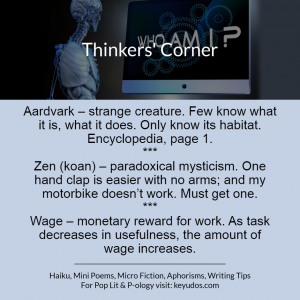
HOW TO CREATE A CHARACTER
Stories need characters, but if you simply match the character to the story, then it will fail. To create a successful character you need to be much more subtle, and take advantage of a rich storytelling culture that has been around for millennia.
We are told that stereotypical characters are cliché, and this is quite true. But an advance on the stereotype can provide a character that can literally get under the skin of the reader, and if successful you’re a winner straight away.
It is all to do with the archetype. The psychologist Carl Jung realized that archetypal characters exist in dream and myth. Principal archetypes are the sage, the mother, the hero, the child, the seductress and the trickster.
You will find them throughout myth. The sage ranges from Jupiter to our image of God. Now guess who he is in Lord of the Rings or Harry Potter. Why are those characters so good? Because they take their form from myth.
Throughout life we constantly soak up images of these mythological archetypes, and we do so because, in reality, they are expressions of stages of our lives. The mythological character is our psyche writ large.
The writer who can successfully transfer this image to a story is helped by a lifetime’s enculturation. Consider the hero of myth, the loner, coming from nowhere, vanquishing the monster and transforming people’s lives. Hercules? Or James Bond.
ORIGINALITY BE DAMNED
It disgusts me to have to say this, but if you want to write original material, you’re wasting good stamps sending it to a major publisher. Apart from the fact that it’s impossible to get your manuscript through the machine, originality is out of style.
Once upon a time publishers were at the cutting edge of innovation and originality, always on the look out for something new. A rich culture was the result, running parallel with a healthy publishing industry based on ideas.
Most of those publishers have now been swallowed up by the big money men, and a once proud industry has been reduced to accountancy. New ideas may be failures and that is bad for the bank balance.
Gone are the days when a publisher would nurture a writer through two, maybe three, market failures, safe in the knowledge that, if the third or fourth was a success, the others would follow through. Now, formula novels are the only likely way of getting into print.
This situation will change eventually. One day, small presses will break through their anonymity and hit the reading public with a new style of publishing and writing. But until then, the second oldest profession is the only way to the top.
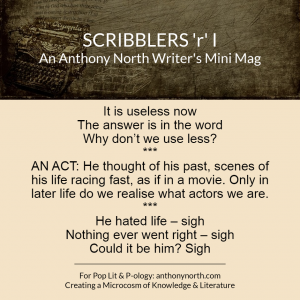
AN EMOTIVE WRITER
Every writer worries about being liked. And as a writer I confess to this psychological problem. Nobody wants to be hated, do they? But perhaps they should. Perhaps writers should forget about sentiment and aim for an audience that would hate them.
This seems a ridiculous proposition, but think about it a moment. The job of a writer is to entertain and inform. But it is also to create controversy. After all, if you’re not noticed no one will read you and you can neither entertain nor inform.
There is a mantra that all publicity is good publicity, and this is very true. There is nothing worse than no publicity at all, for you have not reached an audience, and this is usually because you have not aroused emotion.
This is the key to good writing. There is nothing worse than not causing emotion. Indifference, you see, is death. And there is one way you know you’ve made it – when people declare they hate you. Because for everyone who hates your work, there is another who loves it.
